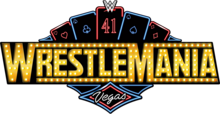
'Beat the Champ': The Mountain Goats offer a musical tribute to the squared circle

"Rowdy" Roddy Piper isn’t an obvious choice for a musician’s muse. For John Darnielle, the acclaimed lead singer of The Mountain Goats and a 2014 National Book Award nominee, wondering "Why not Piper?" is exactly the kind of question he asks when deciding what it will take to perform another great rock show.
"I mean, the one thing is, I fully inhabit the song, completely buying into it." Darnielle said. "To get this, Roddy Piper's the guy. So, you watch old Piper stuff and you learn how to be present for your work. [You have to be] 100 percent there; no point in showing up if you're not 100 percent there."
Darnielle, you see, is an avid supporter of sports-entertainment, and his band now preaches the gospel of grappling across 13 fight-infused tracks on their new LP, "Beat the Champ."
Before a recent performance at City Winery in New York City, Darnielle sat down with WWE.com to discuss The Mountain Goats’ new album, his memories of his favorite Superstars competing at Hollywood’s Olympic Auditorium and his unabashed love of wrestling.
The origin of "Beat the Champ"
There’s no shortage of writing prompts that can emerge from what happens in a wrestling ring. Darnielle keeps many of those ideas in a notebook, but it was one specific note involving WWE Hall of Famer Greg "The Hammer" Valentine that provided a prototype for the baker’s dozen of tracks appearing on "Beat the Champ."
Preparing to play a solo performance in San Francisco, Darnielle revisited a song title he had conjured up about "The Hammer" and promptly jotted down some lyrics. He elected to improvise the tune that night, hoping the crowd would remain sympathetic for an experimenting singer up on the stage. Needless to say, the audience ate the new number up, savoring a song that the Mountain Goats lead singer dedicated to Valentine’s ruthless reputation.
"It was about, because this was Greg Valentine's thing, 'I want to break people's legs. I don't care if I win,'" Darnielle said. "And I was like: Wow, that's ... that's pure evil, right? He just wants to break people's legs with that Figure Four Leglock.
"And so, I wrote that song and I really liked inhabiting a wrestling character, taking it at face value. With characters, it was really interesting and exciting for me to be able to sort of harness that. So then, I was ad-libbing a melody a couple of years ago, and I sang the opening lines to ‘Southwestern Territory’ and got the idea. I think I'd had that title, and I just kept writing the songs."
Remembering L.A.’s Olympic Auditorium
Darnielle’s education in sports-entertainment came from two different arenas in late 1970s southern California. For starters, he often watched wrestling on the local Spanish language UHF station, as that broadcast regularly offered one hour more programming than the English counterpart.
The other outlet for Darnielle’s interest naturally came in the form of local live events, which occurred at one of the legendary venues for sports-entertainment: Los Angeles' Olympic Auditorium, a former Olympic training center with a seating capacity of more than 10,000. Fans regularly lined up around the block for a chance to snag tickets for events at the Olympic, which regularly featured the famous wrestling family who inspired the Mountain Goats song called "The Legend of Chavo Guerrero."
"The Olympic was its own unique environment," Darnielle said. "Because it was old school Angelenos, and also the growing immigrant population of southern California who preferred the lucha libre style, the high flying and masked wrestlers who weren't nearly as big in the Midwest and South, and [they] demanded local champions. The whole Guerrero family, those guys were huge. Eddie [Guerrero] was big at the Olympic. Hector, Mando and Gory all wrestled in southern California some."
Battles Royal and Andre the Giant at his best
As one of the most beloved wrestling outposts in Los Angeles, the Olympic Auditorium became the place for up-and-coming Superstars to prove their mettle before an eclectic mix of savvy sports-entertainment fans. Many memorable battles played out in the landmark’s cozy confines, including classic stipulation matches that are now celebrated on "Beat the Champ" with songs like "Unmasked!" and "Hair Match."
Yet only one featured contest truly won over Darnielle’s heart: the Battle Royal. And who can say they are a Battle Royal aficionado unless they witnessed one featuring the first WWE Hall of Famer in history?
"I tell this story a million times, but it's still one of my favorites," Darnielle said. "You've seen the Battle Royal? Back in the day, it looked like real mayhem. It was like, 14 guys in a ring, and suddenly everybody's kicking everybody else's a**.
"Andre's in there, and when you see Andre the Giant wrestle is when fantasies begin to dissolve for you because you're like, 'There's literally no chance anyone can beat him. He's just too big.'"
In one memorable encounter, Darnielle recounted seeing a Battle Royal whittle down to a final four that included Andre the Giant, Chavo Guerrero, Sr., Bad Bad Leroy Brown and Eddie Mansfield. The prior two cleared the latter pair from the ring, leaving a hotly-anticipated showdown between the seemingly doomed local hero, Chavo Classic, and the heavily favored world’s hero, Andre. Tension and anxiety filled the Olympic at the thought of these two competitors tearing into each other … until they didn’t.
Instead, Chavo and Andre showed each other the ultimate sign of respect. And Darnielle, who relives this goosebump-inducing moment with every retelling, always extends a hand outward in the same manner he witnessed this particular L.A. story.
"My stepfather hated this so much," Darnielle said. "[They were] circling and circling ... then, a handshake. I mean, I loved it. I thought it was the best thing ever. It was so sweet and great, you know? And Andre raises Chavo's hand in acknowledgement of our local hero and it was the best thing, the best thing. I [later] shook Andre the Giant's hand and it was an incredible thing to do."
The most heavy metal Superstars ever
The conviction that The Mountain Goats bring to every performance is unquestioned, but the actual sound you’ll hear from show to show or, in the case of "Beat the Champ," from track to track will vary. There’s a jazzy piece like "Fire Editorial" (which was inspired by the controversial career of WWE Hall of Famer The Sheik) to an indie rock standard like "The Legend of Chavo Guerrero."
Their lead singer, however, freely admitted his list of musical influences includes heavy metal music. Darnielle, who boasts Hüsker Dü frontman and former WCW employee Bob Mould among his many friends, loves the raw emotion and perpetual foreboding that comes with this particular genre.
And in Darnielle’s mind, Bray Wyatt embodies that heavy metal sensibility, which The Mountain Goats frontman can describe in just one word.
"Evil," Darnielle said. "[Wyatt] telegraphs a believable love of evil. To me, what makes a villain is the guy who you look at and you go, 'Now, you have embraced wrong.' Because that's incomprehensible. It's very heavy metal."
That "Heavy Metal” feeling isn’t specific to male Superstars, either. That becomes apparent when you dig deeper into the "Beat the Champ" track list, leading to a song that Darnielle dedicated to one of the most feared and fearless female Superstars ever: Luna Vachon.
"I consider Luna Vachon one of the greatest of all time," Darnielle said. "I have this song about her where she's attacking and she's humbled her opponents, and they’re rolling around the floor and can't do anything. She gets ready to attack, and then she seems to get possessed by her own evil."
Rekindled love for sports-entertainment
It’s no secret that "Beat the Champ" represents a golden era of Darnielle’s wrestling fandom, which played out in late 1970s Los Angeles. Darnielle lived for every magical moment where Chavo Guerrero, Sr., Roddy Piper and others gave their all before an adoring Olympic Auditorium audience.
That passion for wrestling grew and changed as Darnielle grew older, but it never dissipated. As a result, "Beat the Champ" sounds like a 13-track love letter from true squared circle supporters, each capturing a different part of what makes the WWE Universe an enticing place to embrace for so many. The Mountain Goats recite their Superstar sonnets at every stop of their current tour, and Darnielle stands front and center as a proud ambassador for wrestling, and as an old school fan who’s since rekindled his one true childhood love.
"There's something about wrestling that's kind of progressive, you know?" Darnielle said. "It's kind of this open place for people to sort of play these characters. In a way, you expose what those characters are like in real life. It's sort of showing the true face of people, who would otherwise be saying stuff behind your back. And so yeah, with the release of the album, my involvement has grown exponentially."
The Mountain Goats' latest LP, "Beat the Champ," is now available on iTunes.
WWE Shows Latest Results
Raw results, Nov. 11, 2024: Bianca Belair, Jade Cargill, Naomi and IYO SKY dispel Liv Morgan, Raquel Rodriguez, Nia Jax and Tiffany Stratton!
Full ResultsSmackDown results, Nov. 15, 2024: Roman Reigns is left looking for answers after Paul Heyman's cell phone is disconnected
Full Results-1--c6177abc7ca876efa0cb6f35f1dc4038.jpg 1125w)


















